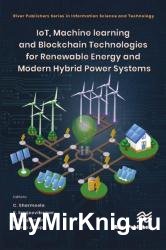 Название: IoT, Machine Learning and Blockchain Technologies for Renewable Energy and Modern Hybrid Power Systems Название: IoT, Machine Learning and Blockchain Technologies for Renewable Energy and Modern Hybrid Power Systems
Автор: C. Sharmeela, P. Sanjeevikumar, P. Sivaraman
Издательство: River Publishers
Год: 2022
Страниц: 306
Язык: английский
Формат: pdf (true)
Размер: 17.9 MB
This edited book comprises chapters that describe the IoT, Machine Learning (ML), and blockchain technologies for renewable energy and modern hybrid power systems with simulation examples and case studies.
This book covers the different sections dealing with fundamentals and applications of IoT, Machine Learning, and blockchain technologies in renewable energy and hybrid power systems. It includes case studies like power quality monitoring for low voltage distribution systems through IoT, health monitoring of distribution transformers through IoT, blockchain with SHA-256, 384, and 512 application to renewable energy resources, etc.
It well describes topics with theoretical-based analysis and followed by numerical solutions and simulation results, case studies which make additional credit to readers for their future research or profession. The chapters are lucidly covering the significant and bottle-neck challenges prevailing in the renewable energy and hybrid power systems, enabling the reader to better understand. The book will be readily available as reference materials for IoT, machine learning, and blockchain technology applications to renewable energy & hybrid power systems, and enabling the student community to create more interest and attention to take up the challenging renewable energy profession for their endeavors.
Machine learning (ML), an integral part of Artificial Intelligence (AI), has emerged as one of the most important technologies in today’s world. So what do these terms mean? In this chapter, the concept and involved techniques in ML have been elucidated. AI has the potential to make decisions like humans and consists of standard rules encoded in the form of computer programs. Computers and computational techniques are included in the central field of computer science. The ML algorithms learn from the processed data and build predictions on that data. It is possible to alter the action and reaction of large data in ML to achieve higher adaptability, efficiency, and scalability. Next, Deep Learning (DL) is also a specific kind of advanced ML which uses deep neural networks to solve distinct problems. The deep neural network implements minuscule computations on numerous layers for performing duties like humans.
Скачать IoT, Machine Learning and Blockchain Technologies for Renewable Energy and Modern Hybrid Power Systems
|